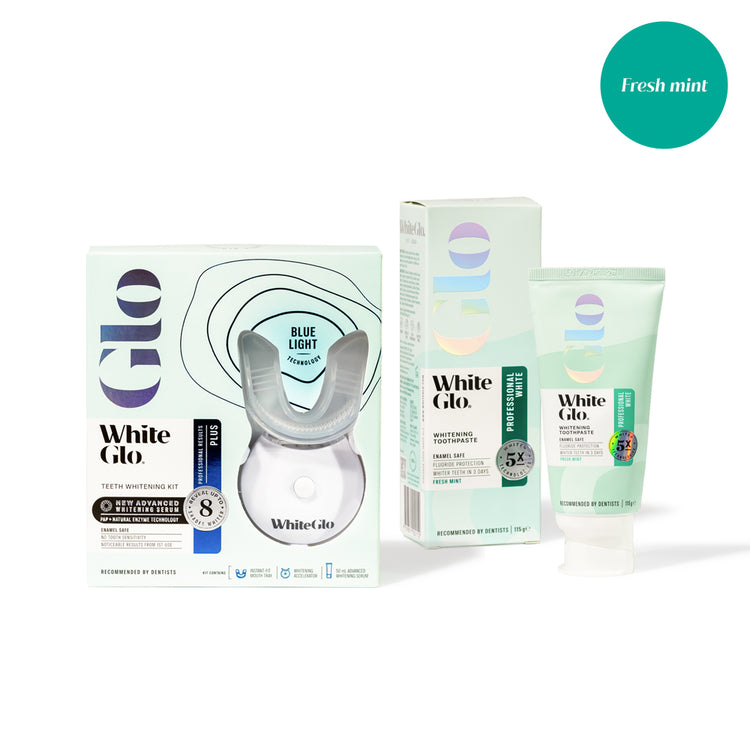A teeth whitening kit is a product or set of products designed to help individuals whiten their teeth, usually from the comfort of their own homes. These kits typically include various components and may vary in terms of the ingredients and methods used for whitening. Here’s an overview of what you can expect to find in a typical teeth whitening kit:
Featured Photo by Jose Vazquez on Unsplash
- Whitening Gel or Solution: The primary component of a teeth whitening kit is a whitening gel or solution. This gel contains ingredients like hydrogen peroxide or carbamide peroxide, which are effective at breaking down stains on the surface of teeth and whitening them.
- Mouth Trays: Many kits include custom-fit or boil-and-bite mouth trays made from soft plastic. These trays are used to hold the whitening gel in place against the teeth during treatment.
- LED or UV Light: Some kits come with LED or UV lights that are intended to activate the whitening gel and potentially enhance the results. The light may be used in combination with the mouth trays.
- Desensitizing Gel (Optional): To minimize tooth sensitivity, some kits include a desensitizing gel that can be applied after whitening. This helps reduce any potential discomfort.
- Instructions: Comprehensive instructions on how to use the kit are typically included. It’s crucial to follow these instructions carefully to achieve safe and effective results.
- Shade Guide: Some kits provide a shade guide, which allows you to track your progress by comparing the current color of your teeth to a set of reference shades.
- Storage Case: Many kits come with a storage case to keep the mouth trays and other components clean and organized.

Also Read: Overview White Glo teeth whitening
When using a teeth whitening kit, it’s essential to consider the following:
- Consult with a dentist: Before starting any teeth whitening regimen, it’s a good idea to consult with a dentist or dental professional to ensure that teeth whitening is safe and appropriate for your dental health.
- Follow the instructions: Adhere to the usage instructions provided with the kit, including the recommended duration of each treatment session. Overuse or misuse can lead to tooth sensitivity or other issues.
- Be patient: Results from teeth whitening kits may take some time to become noticeable. It often requires multiple sessions over several days or weeks to achieve the desired level of whitening.
- Be cautious of sensitivity: Some individuals may experience increased tooth sensitivity during or after whitening. If this occurs, reduce the frequency of treatments and consider using a desensitizing gel.
- Avoid staining substances: To maintain the results, it’s advisable to avoid foods and beverages that can stain teeth, such as coffee, tea, red wine, and tobacco products.
Always ensure that you purchase a reputable teeth whitening kit from a trusted source, and if you have any concerns or experience adverse effects, seek advice from a dentist or dental professional.
Pros and Cons Teeth Whitening Kit
Using a teeth whitening kit can have both pros and cons. It’s essential to consider these factors when deciding whether to use one. Here are the pros and cons of teeth whitening kits:
Pros:
- Improved Aesthetics: The most obvious benefit is that teeth whitening kits can help improve the appearance of your smile by removing stains and discoloration, giving you a whiter and brighter smile.
- Convenience: Teeth whitening kits are convenient for at-home use. You can whiten your teeth at your own pace and on your schedule, which is especially useful for individuals with busy lifestyles.
- Affordability: Teeth whitening kits are generally more affordable than in-office professional teeth whitening treatments. Over-the-counter kits are available at a range of price points, making teeth whitening accessible to many people.
- Non-Invasive: Using teeth whitening kits is a non-invasive way to improve your smile. Unlike some cosmetic dental procedures, they don’t involve drilling, surgery, or the removal of tooth enamel.
- Maintainable Results: After achieving your desired level of whiteness, you can typically maintain the results with occasional touch-up treatments or by avoiding stain-causing foods and beverages.
Cons:
- Tooth Sensitivity: One of the most common side effects of teeth whitening, whether from kits or professional treatments, is tooth sensitivity. This sensitivity is usually temporary but can be uncomfortable.
- Gum Irritation: The whitening gel used in some kits can irritate the gums if it comes into contact with them. It’s important to use the provided mouth trays or other application methods correctly to minimize contact with the gums.
- Uneven Results: Achieving even results with at-home kits can be challenging. Some areas of your teeth may whiten more or less than others, leading to an uneven appearance.
- Not Suitable for All Stains: Teeth whitening kits are most effective for extrinsic stains (surface stains) caused by factors like food, beverages, and smoking. They may be less effective for intrinsic stains (stains within the tooth) or stains caused by certain medications or dental conditions.
- Limited Whitening: Over-the-counter kits may not provide the same level of whitening as professional in-office treatments. If you have severe staining or desire dramatic results, you may need professional treatment.
- Overuse Risk: Excessive use of teeth whitening products, especially those with high concentrations of whitening agents, can potentially harm tooth enamel and lead to increased sensitivity or damage.
- Temporary Results: Teeth whitening, whether through kits or professional treatments, is not permanent. The results can fade over time, especially if you continue to consume staining foods and beverages or use tobacco products.
Before using a teeth whitening kit, it’s a good idea to consult with a dentist, especially if you have any concerns about tooth sensitivity or existing dental issues. A dental professional can guide the most appropriate and safe way to achieve your desired level of whiteness. Additionally, always follow the instructions provided with the kit for the best and safest results.

Leave a Reply